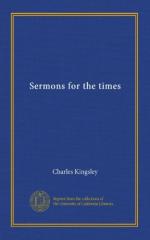Some dislike appeals to honour. I cannot, as long as St. Paul himself appeals to it so often, both in the individual and in bodies. His whole Epistle to Philemon is an appeal, most delicate and graceful, to Philemon’s sense of honour—to the thought of what he owed Paul, of what Paul wished him to repay, not with money, but with generosity.
And his appeal to the Corinthians is a direct appeal to their honour: not to fears of any punishment, or wrath of God, but to the respect which they owed to themselves as members of a body, the Church of Corinth; and to the respect which they owed to that body as a whole, and which they had disgraced by allowing an open scandal in it.
And his appeal was successful: they took it just as it was meant; and he rejoices in the thought that they did so. ’For this, that ye sorrowed after a godly sort, what carefulness it wrought in you, yea, what clearing of yourselves, what indignation, what fear, what vehement desire, what zeal, what revenge! In all things you have approved yourselves to be clear in this matter,’
Noble words, and nobly answered. My friends, you, too, are members of a body: go, and do likewise in the matter of this Society’s failing funds.
* * * * *
May I boldly ask you to alter this to-day? This, remember, is no common day. It is a day of thankfulness. The thankfulness which you professed, and I doubt not many of you felt, on Thursday night, has not evaporated, I trust, by Sunday morning. You have not yet forgotten—I trust that there is many a one who will never forget— what you owe as townsmen of this place, to God who has preserved you safe through the dangers and sorrows of the past autumn. You owe more than one debt to God. You owe, all England owes, thanks to Him for the late bounteous harvest, thanks to Him for the present prosperous seed-time: think what our state might have been with scarcity, as well as war, upon us, and pay part of your debt this day. You owe a thank-offering for the cessation of the cholera; a thank-offering for the sparing of your own lives;—pay it now. You owe a thank-offering for the glorious victories of our armies:—pay it now. You belong, too, to an honourable body, which has a noble history, and sets you many a noble example; show yourselves worthy of that body, that history, those examples, now.
And what fitter place than this very church to awaken within you the thought of duty and of public spirit?—this church which stands as God’s own sign that you are the townsmen, the representatives, ay, some of you the very descendants, of many a noble spirit of old time?—this church, in which God’s blessing has been invoked on deeds of patriotism and enterprise, of which the whole world now bears the fruit?—these walls, in which Elizabeth’s heroes, your ancestors, have prayed before sailing against the Spanish Armada,— these walls, which saw the baptism of the first red Indian convert,




